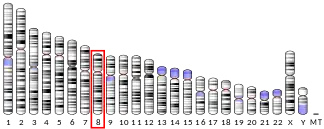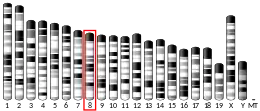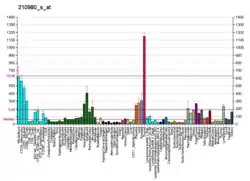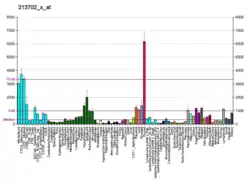ASAH1
The ASAH1 gene encodes in humans the acid ceramidase enzyme.[5][6][7]
Function
This gene encodes a heterodimeric protein consisting of a nonglycosylated alpha subunit and a glycosylated beta subunit that is cleaved to the mature enzyme posttranslationally. The encoded protein catalyzes the synthesis and degradation of ceramide into sphingosine and fatty acid. Mutations in this gene have been associated with a lysosomal storage disorder known as Farber disease and, recently, with a rare neurodegenerative condition known as spinal muscular atrophy with progressive myoclonic epilepsy.[8] Two transcript variants encoding distinct isoforms have been identified for this gene.[7] In melanocytic cells ASAH1 gene expression may be regulated by MITF.[9]
As a glioblastoma drug target
ASAH1 expression is upregulated following radiation, suggesting it plays a role in conferring radioresistance to glioblastoma and in the development of recurrent glioblastoma.[10] Inhibiting the activity of ASAH1 with carmofur, a drug that has been approved for clinical treatment of colorectal cancers in several countries, leads to substantial cell deaths and as a result has been proposed as a drug target in the treatment of glioblastoma.[11] It has also been suggested to be a novel drug target against pediatric brain tumors as well.[12]
References
- GRCh38: Ensembl release 89: ENSG00000104763 - Ensembl, May 2017
- GRCm38: Ensembl release 89: ENSMUSG00000031591 - Ensembl, May 2017
- "Human PubMed Reference:". National Center for Biotechnology Information, U.S. National Library of Medicine.
- "Mouse PubMed Reference:". National Center for Biotechnology Information, U.S. National Library of Medicine.
- Koch J, Gärtner S, Li CM, Quintern LE, Bernardo K, Levran O, Schnabel D, Desnick RJ, Schuchman EH, Sandhoff K (December 1996). "Molecular cloning and characterization of a full-length complementary DNA encoding human acid ceramidase. Identification Of the first molecular lesion causing Farber disease". The Journal of Biological Chemistry. 271 (51): 33110–5. doi:10.1074/jbc.271.51.33110. PMID 8955159.
- Li CM, Park JH, He X, Levy B, Chen F, Arai K, Adler DA, Disteche CM, Koch J, Sandhoff K, Schuchman EH (December 1999). "The human acid ceramidase gene (ASAH): structure, chromosomal location, mutation analysis, and expression". Genomics. 62 (2): 223–31. doi:10.1006/geno.1999.5940. PMID 10610716.
- "Entrez Gene: ASAH1 N-acylsphingosine amidohydrolase (acid ceramidase) 1".
- Zhou J, Tawk M, Tiziano FD, Veillet J, Bayes M, Nolent F, Garcia V, Servidei S, Bertini E, Castro-Giner F, Renda Y, Carpentier S, Andrieu-Abadie N, Gut I, Levade T, Topaloglu H, Melki J (July 2012). "Spinal muscular atrophy associated with progressive myoclonic epilepsy is caused by mutations in ASAH1". American Journal of Human Genetics. 91 (1): 5–14. doi:10.1016/j.ajhg.2012.05.001. PMC 3397266. PMID 22703880.
- Hoek KS, Schlegel NC, Eichhoff OM, Widmer DS, Praetorius C, Einarsson SO, Valgeirsdottir S, Bergsteinsdottir K, Schepsky A, Dummer R, Steingrimsson E (December 2008). "Novel MITF targets identified using a two-step DNA microarray strategy". Pigment Cell & Melanoma Research. 21 (6): 665–76. doi:10.1111/j.1755-148X.2008.00505.x. PMID 19067971. S2CID 24698373.
- Doan NB, Nguyen HS, Al-Gizawiy MM, Mueller WM, Sabbadini RA, Rand SD, Connelly JM, Chitambar CR, Schmainda KM, Mirza SP (October 2017). "Acid ceramidase confers radioresistance to glioblastoma cells". Oncology Reports. 38 (4): 1932–40. doi:10.3892/or.2017.5855. PMC 5652937. PMID 28765947.
- Doan NB, Alhajala H, Al-Gizawiy MM, Mueller WM, Rand SD, Connelly JM, Cochran EJ, Chitambar CR, Clark P, Kuo J, Schmainda KM, Mirza SP (December 2017). "Acid ceramidase and its inhibitors: a de novo drug target and a new class of drugs for killing glioblastoma cancer stem cells with high efficiency". Oncotarget. 8 (68): 112662–74. doi:10.18632/oncotarget.22637. PMC 5762539. PMID 29348854.
- Doan NB, Nguyen HS, Montoure A, Al-Gizawiy MM, Mueller WM, Kurpad S, Rand SD, Connelly JM, Chitambar CR, Schmainda KM, Mirza SP (April 2017). "Acid ceramidase is a novel drug target for pediatric brain tumors". Oncotarget. 8 (15): 24753–61. doi:10.18632/oncotarget.15800. PMC 5421885. PMID 28445970.
External links
- Human ASAH1 genome location and ASAH1 gene details page in the UCSC Genome Browser.
Further reading
- Perry DK, Hannun YA (December 1998). "The role of ceramide in cell signaling". Biochimica et Biophysica Acta (BBA) - Molecular and Cell Biology of Lipids. 1436 (1–2): 233–43. doi:10.1016/S0005-2760(98)00145-3. PMID 9838138.
- Bernardo K, Hurwitz R, Zenk T, Desnick RJ, Ferlinz K, Schuchman EH, Sandhoff K (May 1995). "Purification, characterization, and biosynthesis of human acid ceramidase". The Journal of Biological Chemistry. 270 (19): 11098–102. doi:10.1074/jbc.270.19.11098. PMID 7744740.
- Maruyama K, Sugano S (January 1994). "Oligo-capping: a simple method to replace the cap structure of eukaryotic mRNAs with oligoribonucleotides". Gene. 138 (1–2): 171–4. doi:10.1016/0378-1119(94)90802-8. PMID 8125298.
- Suzuki Y, Yoshitomo-Nakagawa K, Maruyama K, Suyama A, Sugano S (October 1997). "Construction and characterization of a full length-enriched and a 5'-end-enriched cDNA library". Gene. 200 (1–2): 149–56. doi:10.1016/S0378-1119(97)00411-3. PMID 9373149.
- Seelan RS, Qian C, Yokomizo A, Bostwick DG, Smith DI, Liu W (October 2000). "Human acid ceramidase is overexpressed but not mutated in prostate cancer". Genes, Chromosomes & Cancer. 29 (2): 137–46. doi:10.1002/1098-2264(2000)9999:9999<::AID-GCC1018>3.0.CO;2-E. PMID 10959093. S2CID 21766341.
- Strelow A, Bernardo K, Adam-Klages S, Linke T, Sandhoff K, Krönke M, Adam D (September 2000). "Overexpression of acid ceramidase protects from tumor necrosis factor-induced cell death". The Journal of Experimental Medicine. 192 (5): 601–12. doi:10.1084/jem.192.5.601. PMC 2193270. PMID 10974027.
- Bär J, Linke T, Ferlinz K, Neumann U, Schuchman EH, Sandhoff K (March 2001). "Molecular analysis of acid ceramidase deficiency in patients with Farber disease". Human Mutation. 17 (3): 199–209. doi:10.1002/humu.5. PMID 11241842. S2CID 39656479.
- Ferlinz K, Kopal G, Bernardo K, Linke T, Bar J, Breiden B, Neumann U, Lang F, Schuchman EH, Sandhoff K (September 2001). "Human acid ceramidase: processing, glycosylation, and lysosomal targeting". The Journal of Biological Chemistry. 276 (38): 35352–60. doi:10.1074/jbc.M103066200. PMID 11451951.
- Muramatsu T, Sakai N, Yanagihara I, Yamada M, Nishigaki T, Kokubu C, Tsukamoto H, Ito M, Inui K (November 2002). "Mutation analysis of the acid ceramidase gene in Japanese patients with Farber disease". Journal of Inherited Metabolic Disease. 25 (7): 585–92. doi:10.1023/A:1022047408477. PMID 12638942. S2CID 26208268.
- Zhang H, Li XJ, Martin DB, Aebersold R (June 2003). "Identification and quantification of N-linked glycoproteins using hydrazide chemistry, stable isotope labeling and mass spectrometry". Nature Biotechnology. 21 (6): 660–6. doi:10.1038/nbt827. PMID 12754519. S2CID 581283.
- Okino N, He X, Gatt S, Sandhoff K, Ito M, Schuchman EH (August 2003). "The reverse activity of human acid ceramidase". The Journal of Biological Chemistry. 278 (32): 29948–53. doi:10.1074/jbc.M303310200. PMID 12764132.
- He X, Okino N, Dhami R, Dagan A, Gatt S, Schulze H, Sandhoff K, Schuchman EH (August 2003). "Purification and characterization of recombinant, human acid ceramidase. Catalytic reactions and interactions with acid sphingomyelinase". The Journal of Biological Chemistry. 278 (35): 32978–86. doi:10.1074/jbc.M301936200. PMID 12815059.
- Hara S, Nakashima S, Kiyono T, Sawada M, Yoshimura S, Iwama T, Banno Y, Shinoda J, Sakai N (August 2004). "p53-Independent ceramide formation in human glioma cells during gamma-radiation-induced apoptosis". Cell Death and Differentiation. 11 (8): 853–61. doi:10.1038/sj.cdd.4401428. PMID 15088070.
- Lewandrowski U, Moebius J, Walter U, Sickmann A (February 2006). "Elucidation of N-glycosylation sites on human platelet proteins: a glycoproteomic approach". Molecular & Cellular Proteomics. 5 (2): 226–33. doi:10.1074/mcp.M500324-MCP200. PMID 16263699.





